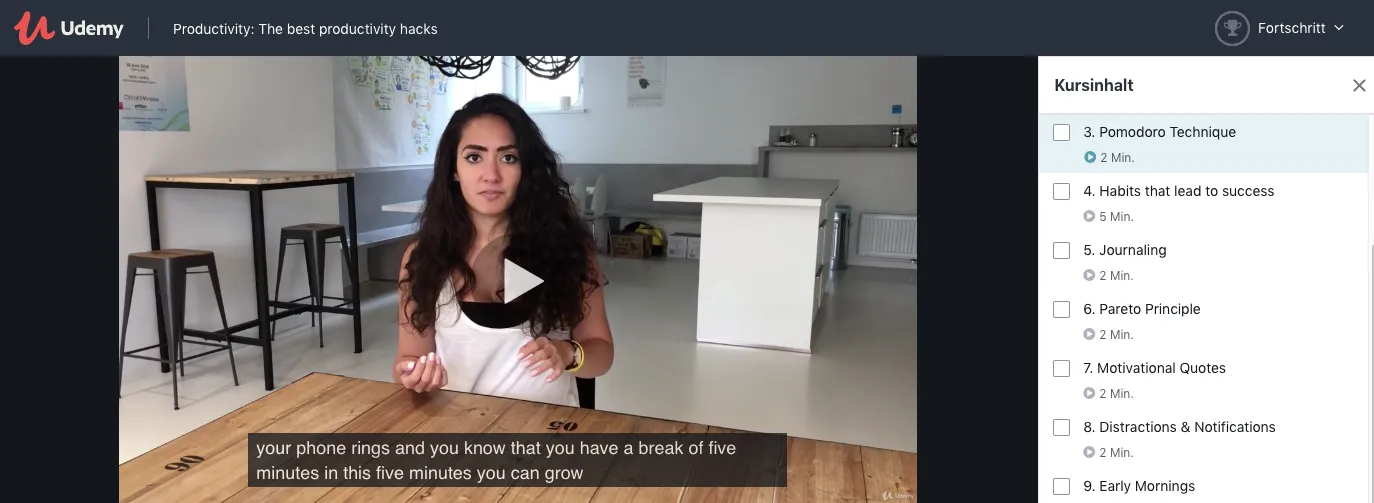I decided to become an entrepreneur when I was 19 years old. I didn’t have a groundbreaking idea and no clue how I’d make money, but I knew that I didn’t want to pursue a traditional corporate career after my studies.
All I knew is that I wanted to be independent — financially, locally, and mentally. I wanted to work whenever, wherever I want and be able to choose the projects I work on.
Today, four years later, I’m in that fortunate place where I’m living that reality: I built a 6-figure online business with my better half, work on projects that excite me, and experience the freedom I dreamt of.
But whenever I tell my story, a huge part is missing because most people only see the tip of the iceberg. They see my current numbers, the current reality, and the freedom I experience right now.
But what they don’t see is that I spent almost three years trying to figure out what I actually want to do. And they also don’t see that I had to make many mental shifts in order to go from frustrated wannabe entrepreneur to 6-figure business owner.
I started my entrepreneurial journey by organizing personal development workshops for students — here’s a picture of the first one in 2017:

Photo by Author — October 2017
In the following years, I hosted dozens of workshops per year, invested in my own education, and became a certified trainer.
But even though I enjoyed these events, I knew that I didn’t want to spend my entire life organizing workshops, so I started to explore digital business models.
In summer 2018, I launched my first online courses:

A “Peak Productivity” Course on Udemy — Launched in August 2018
I recorded these courses with my phone camera and a horrible microphone. In total, they probably made $1,000 until now.
A year later, I still didn’t know what I really wanted to do, so I self-published a book that includes everything I learned about personal development in the past three years:

My book “Selbstpotenzial” — Launched in October 2019
Long story short: I spent the majority of my entrepreneurial life not knowing how to turn my dreams into reality.
I tried a lot, failed a lot, and learned a lot.
And I experienced many mental shifts that helped me start from scratch over and over again until I finally figured out what I want and how to get it.
“When you change the way you look at things, the things you look at change.”
— Max Planck
From Reactive to Decisive
In the beginning, my biggest fear was to be too expensive.
I wanted my products and services to be affordable for anyone and was afraid of charging money. I’d rather do something for free instead of starting an uncomfortable conversation about money.
Guess what happens when you do that? You end up not making money. At least not as much as you intended to.
At some point, I realized that it’s me who decides how much I charge for my services, not the market, my customers, or my competition.
Today, I’m making sure that I’m not underpriced. If I don’t lose a potential customer because of my pricing for a few months, I know that I could increase my rates.
Of course, I don’t do this blindly — I study the market, survey my community, and stay updated on current changes. But ultimately, I make business decisions based on what I want, not based on the wishes of potential customers.
I’m confident about my products and services. If someone wants or needs cheaper options, they’ll find them. But if they want the best, they’ll need to pay my rates without fuss or quibble.
I don’t have time for clients who don’t want to pay the full price. And I surely didn’t build an automated business to deal with annoying requests of people who expect special treatment.
I worked my ass off to learn the skills I needed. I worked in the evenings, on weekends, and during all my holidays and I surely didn’t do so to be everybody’s darling. I did it to be able to choose which clients I want and whom I want to reject.
How to do it:
You’ll never find satisfaction in business if you act as if you’re the puppet of your customers.
Being flexible and adapting to changes is important, but so is staying true to your core principles and charging the fee you want or need.
Everybody wants discounts and special rates, but you’ll end up starving if you say yes and amen to everyone.
As an entrepreneur, you need to know your worth and then add tax. A lot of tax.
Never Ever Accept Unsolicited Feedback or Advice
For the first three years of my entrepreneurial journey, I lacked confidence when making decisions, no matter how big or small.
I always asked for the opinion of my partner and in most cases, I asked many more people.
And the sad reality is that most people are dead keen on sharing their opinion on anything, even if they have no experience or nothing to say about it.
I wasted enormous amounts of time listening to the advice of people who had no justification for giving feedback on my ideas and plans. But the truth is that whom you ask for feedback matters more than anything else.
How to do it:
Never ask someone for advice if they didn’t achieve what you want to achieve.
I had two mentors who were successful businesswomen but had no idea about digital business models.
They both had great ideas and knew how to do business, but none of them had ever set up an email list or built a landing page, so there was no point in asking them specific questions about my next business moves as a digital entrepreneur.
Everyone loves talking, but most people talk nonsense. If you want to get feedback on your work, ideas, or plans, make sure to ask people who actually have something to say.
You Can’t Always Do What You Love
Most people who quit their job to start their own business do it because they want to do what they love. I was one of them. I didn’t have to quit a job, but I surely started my business because I wanted to follow my passion and do what I love.
What I learned in the past four years is that what you love doesn’t really matter.
If you want to build a successful business that’s paying for more than just your monthly bills, you’ll need to do a lot of stuff that you don’t enjoy. Building a successful business requires so much more than what most people think.
When people look at my business, they think that all I do is creating content and engaging with my community. Now that’s indeed an important part of my daily schedule, but the most crucial tasks are the ones you don’t see: email marketing, copywriting, funnels, and all the technical back-end stuff.
How to do it:
If you want to build a successful business, you need to put your ego aside and do stuff that sucks until you can outsource it.
You’ll need to learn new skills, relearn things, and delegate tasks to people who can do it more efficiently than yourself.
Even the simplest business model will require you to do some things you won’t enjoy. You need to love the whole journey of entrepreneurship, including all the ups and downs.
You Don’t Need to “Hustle More”
If it were easy, everybody would build their own business and make money online. But it isn’t easy.
Yet, it’s easy to fall for one of the two common lies that most “business gurus” are trying to tell young, unexperienced people:
There’s a group of “coaches” who tell you that all you need to do is keep going, persevering, and hustling more.
And there’s another group who’s all about convincing you that you need to get your mindset right. These folks preach that success starts in your mind and if you’re not successful, it’s because you’re not believing it.
In the past four years, I learned that both approaches are nonsense if you ignore the other part.
You need both: You need to believe in yourself and you need to work your ass off. But you also need so much more.
If you don’t believe that you can win, you won’t act like a winner. And if you don’t do the work, you won’t see the results.
But business success comes down to optimizing your processes, being efficient, delegating tasks, and increasing the time you spend on high-value activities.
How to do it:
Sometimes, putting in the work and hustling more can be the solution to a more successful business. But in most cases, it’s not about how hard you work but about how smart your processes and structures are.
As an entrepreneur, you need to ensure that you don’t waste your time on redundant or repetitive tasks. Otherwise, you‘ll likely find yourself in a rat race that you created for yourself.
The earlier you start creating a blueprint and well-thought structures for certain business activities, the better.
Being Fast Is Better Than Being Perfect
At the beginning of my entrepreneurial journey, I tried to be everybody’s darling and do everything perfectly.
I spent hours designing PowerPoint slides, invoices, or business cards. And I felt good because I thought that I was doing important work for my business.
But the truth is that I was just wasting time.
In most cases, perfectionism is nothing more than a roadblock and getting it done is better than trying to be perfect.
I see so many people who try to do things perfectly and get discouraged if they don’t get recognition for their work. But the truth is that most people don’t care about details; they care about due dates and whether their request is completed or not.
How to do it:
If you’re always trying to be perfect, you’ll likely end up being slow.
And being slow can quickly turn into a disadvantage if you’re not the only one in your market.
Being fast and adapting to changes quickly, on the other hand, can be a strategic advantage.
Final Thoughts
Generalizing business advice is incredibly difficult because each business is different. What might be a million-dollar marketing strategy for me might be a flop for you.
And while these five mindset shifts have been the foundation of my success, they might be useless for someone who’s running a totally different type of business.
But if your goal is to make money online by creating content, supporting people, and sharing your knowledge, I’m sure you’ll need to make these five mindset shifts sooner or later.


